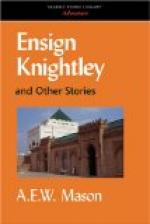Norris dismounted, and stooped to lift the rifle; but all at once he straightened himself, and swung round with his arms guarding his head. There was no one, however, behind him, and he gave a little quavering laugh, and picked up the rifle. It was a heavy lo-bore Holland, a Holland with a single barrel, and that barrel was twisted like a corkscrew. The lock had been wrenched off, and there were marks upon the stock—marks of teeth, and other queer, unintelligible marks as well.
Norris held the rifle in his hands, gazing vacantly straight ahead. He was thinking of the direction in which he had come, southwest, and of the stream which he had crossed, and of the patch of trampled mud, where track obliterated track. He dropped the rifle. It rang upon a stone, and again the screen of foliage shivered and rustled. Norris, however, paid no attention to the movement, but ran back to that object which he had passed, and took it in his hands.
It was oval in shape, being slightly broader at one end than the other. Norris drew his knife and cleaned the mould from one side of it. To the touch of the blade it seemed softer than stone, and smoother than wood. “More like bone,” he said to himself. In the side which he had cleaned, there was a little round hole filled up with mould. Norris dug his knife in and scraped round the hole as one cleans a caked pipe. He drew out a little cube of mud. There was a second corresponding hole on the other side. He turned the narrower end of the thing upwards. It was hollow, he saw, but packed full of mould, and more deliberately packed, for there were finger-marks in the mould. “What an aimless trick!” he muttered vaguely.
He carried the thing back to the rifle, and, comparing them, understood those queer marks upon the stock. They were the mark of fingers, of human fingers, impressed faintly upon the wood with superhuman strength. He was holding the rifle in his hands and looking down at it; but he saw below the rifle, and he saw that his knees were shaking in a palsy.
On an instant he tossed the rifle away, and laughed to reassure himself—laughed out boldly, once, twice; and then he stopped with his eyes riveted upon the granite wall. At each laugh that he gave the shrubs and flowers rippled, and shook the sunlight from their leaves. For the first time he remarked the coincidence as something strange. He lifted up his face, but not a breath of air fanned it; he looked across the hollow, the trees and bushes stood immobile. He laughed a third time, louder than before, and all at once his laughter got hold of him; he sent it pealing out hysterically, burst after burst, until the hollow seemed brimming with the din of it. His body began to twist; he beat time to his laughter with his feet, and then he danced. He danced there alone in the African sunlight faster and faster, with a mad tossing of his limbs, and with his laughter grown to a yell. And as though to keep pace with him, each moment the shiver of the foliage increased. Up and down, crosswise and breadthwise, the flowers were tossed and flung, while their petals rained down the cliff’s face in a purple storm. It appeared, indeed, to Norris that the very granite walls were moving.




